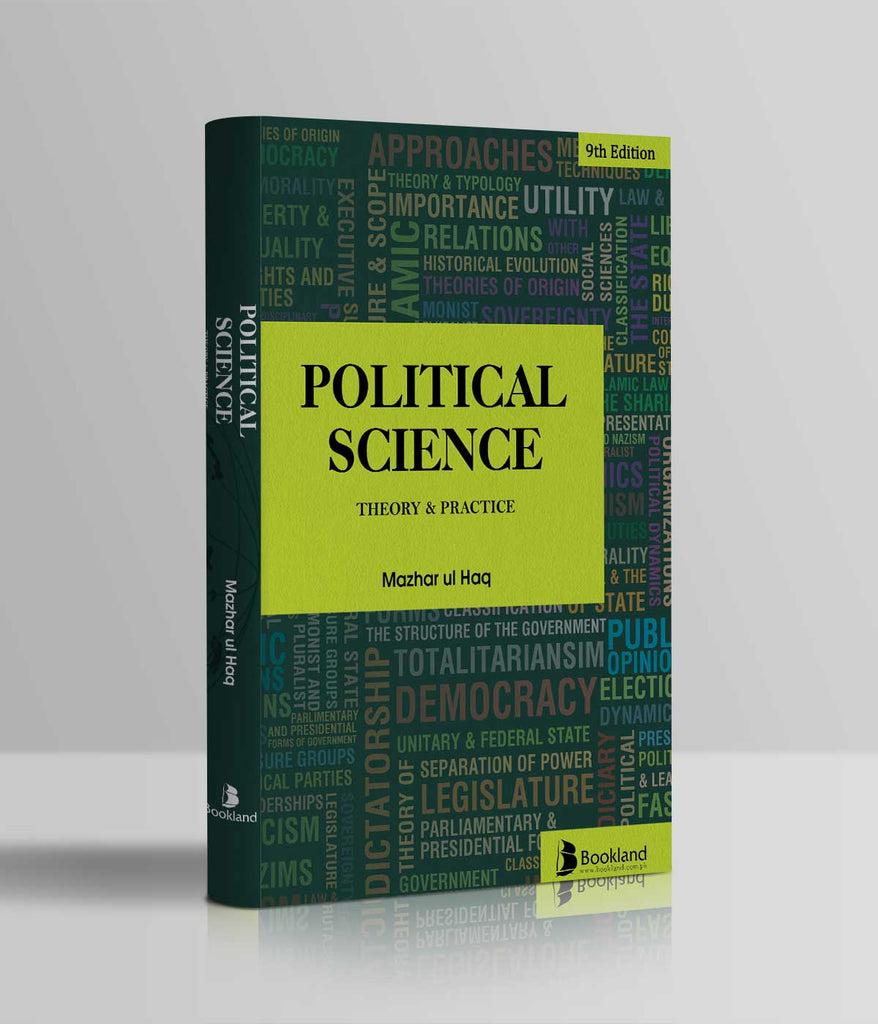Political Science Theory and Practice By Mazhar ul Haq
Best For Competitive Exams (CSS,PMS,PCS & All Descriptive Exams)
Preface to the Ninth
(Revised and Updated) Edition
Political Science is an important branch of social science. It refers to the study of political philosophy, political behavior, political systems, governments, public policies, public administrations, international relations and organizations, etc.
The present revised and updated edition of the book “Political Science: Theory and Practice” is an effort to explore this subject with a modern approach.
Following are the main features of this edition.
· It covers almost all the fields of the subject of Political Science
· It aims at broadening the vision of the students / readers regarding the various specialized areas and aspects of Political Science.
· It highlights the core issues of contemporary politics.
· The topics are discussed in detail to provide a vivid picture of different concepts.
· The organization of the book has been done to facilitate the students/ readers and motivate them for further reading.
I hope this revised and updated version of the book shall enable students/ readers to get maximum benefits from this endeavor.
I would like thank Mr. Tayyab Sultan, project head and director of Bookland, and my colleagues, especially Mr. Khalid Abdul Samad, for his cooperation during the editing of this book.
March, 2021
Mirza Muhammad Azeem
In-house Editor
Bookland
List of Diagrams and Tables
Chart
Diagram
Diagram
Diagram
Flowchart
Table of Aristotle’s Classification of States
Sketch of Modern State
Table: Judicial Organization
CONTENTS
PART I
THE NATURE OF POLITICAL SCIENCE
Chapter | 1
Nature and Scope of Political Science
Chapter | 2
Sub-Divisions of Political Science
Chapter | 3
Approaches, Methods and Techniques of Political Science
Chapter | 4
Political Systems: Theory and Typology
Chapter | 5
Political Science as a Social Science
Chapter | 6
Importance and Utility of Political Science
Chapter | 7
Relations of Political Science with other Social Sciences
Chapter | 8
Inter-Disciplinary concepts in Political Science
PART II
THE NATURE OF THE STATE
Chapter | 9
The State
Chapter | 10
Historical Evolution of the State
Chapter | 11
Theories of Origin of the State
Chapter | 12
The Concept of the State
Chapter | 13
Islamic Concept of the State
Chapter | 14
Theories of the Nature of the State
Chapter | 15
Sovereignty
Chapter | 16
Monist and Pluralist Theories of Sovereignty
Chapter | 17
Islamic Theory of Sovereignty
PART III
THE INDIVIDUAL AND THE STATE
Chapter | 18
Law and Morality
Chapter | 19
Islamic Laws of the Shariah
Chapter | 20
Liberty and Equality
Chapter | 21
Rights and Duties
Chapter | 22
Fundamental Rights in Islam
PART IV
FORMS OF THE MODERN STATE OR GOVERNMENT
Chapter | 23
Classification of States of Governments
Chapter | 24
Dictatorship and Totalitarianism
Chapter | 25
Democracy
Chapter | 26
Unitary and Federal States of Governments
Chapter | 27
Parliamentary and Presidential Forms of Government
PART I
THE NATURE OF POLITICAL SCIENCE
"Political combat is made up not only of the battle for power, but also includes battles between the powers, because power is never totally unified."
(Maurice Duverger)
"The man who classifies facts of any kind whatsoever, who sees their natural relations and describes their sequences, is applying the scientific method and is a man of science. The facts may belong to the past history of mankind, to the social statistics of our great cities, to the atmosphere of the most distant stars, to the digestive organs of a worm, or to the life of a scarcely visible bacillus. It is not the facts themselves which make science but the method in which they are dealt with."
(Karl Pearson)
"Those who deny the existence of a political science, if they mean that there is no body of rules of laws from which a prime minister may infallibly learn how to command a majority in parliament, they would be right as to the fact, but would betray a rather inadequate notion of what (political) science is."
(Sir Fredrick Pollock)
"One aspect of the task of the systematic study of politics is to describe political behaviour in those social situations which recur with sufficient frequency to make prediction useful as a preliminary to control."
(Harold D. Lasswell)
Chapter 1
Nature and Scope of Political Science
Human beings, by nature, are political animal. Owing to their multiple needs, for food, love, security, shelter, sex and the like; they have to live with each other. While trying to satisfy these needs, men and women have to work and cooperate, compete and may even come into conflict with each other. All these create problems and issues of various dimensions and kinds. One of the most important problems is how to organize human activities and relations so that they could satisfy the basic needs and requirements of human beings; and promote cooperation and harmony in the society by preventing conflicts among them, or by resolving disputes as and when they arise; so that human life and society may become better, happier and more productive. This problem is, indeed, very important. If it is not tackled properly, human life and society can suffers, resulting into endless disputes, anarchy, misery, poverty and even the end of all social life. But if it is solved properly, peace, plenty and progress will be the result. Accordingly, every society needs to have such institutions, laws and men and women of authority or power as to regulate all such activities, value relations and interests of all persons and groups living in it. A society which is regulated by laws and by men and women of authority or power is a politically organized society, i.e., some political system exists therein. Political science is a science or study of such a politically organized society, political system or state. In fact, it is a study of political process, or of men and women in the process of governing themselves. It is the application of scientific method to the study of political affairs and events.
1.1 Definitions of Political Science
In a learned discourse, definition of a branch of knowledge (or a subject of study) comes after it has been first properly explained. But in a textbook, it is customary to begin with the definition of the discipline, so that its students may have some idea of what they are going to study. It is especially necessary for the beginners. This is the reason why we shall first define political science before we explain its nature, scope, importance and other aspects.
Political Science can be defined in two different but interrelated ways, namely:
(i) the study of the political institutions, the state or government, and
(ii) the study of the phenomenon of power in human society.
In the beginning, political science was defined as a systematic study of the political institutions of the state or government. Dr. Stephen Leacock says simply that political
Nscience deals with government. Professor J. W. Garner says, "Political science begins and ends with the state." A French author, Paul Janet, writes that political science is that "part of social sciences which treats of the foundations of the state and the principles of government." The Swiss writer. Bluntschli defines political science as "the science which is concerned with the state and endeavours to understand and comprehend the state in its fundamental condition, in its essential nature, its various forms of manifestations and its development."
Later, Professor G. E. G. Catlin approached the study of political science from the standpoint of power. "All politics", he writes, "is by its nature power politics" Accordingly, he defines Political Science as "the science of "organized power in all communities". Again he says, "Politics is a study of all the plurals of the objective control of the relations of human beings and wills". He adds further, "Social activities, such as free play and art, not involving control, lie outside the primary ambit of politics."
Since the end of the Second World War (1939-45), Political Science has been defined as an empirical and functional science. It is a new approach to the study of this science. (We shall study various approaches to this science later on.) Harold D. Lasswell, an American political scientist, declares that political science is primarily concerned with the question: "who gets what, when and how?" Accordingly he defines it "as an empirical discipline, as the study of the shaping and sharing of power". He adds further that it is a science of "a political act performed in power perspective." David Easton, another American political scientist, has approached political science in strictly behavioural terms. He defines political science as "the study of those actions more or less directly related to the making of authoritative allocations of resources and values."
The above two kinds of definitions of political science describe really two interrelated aspects of politics, viz. (i) power and (ii) state or government. Power is the central organizing factor in politics, while state or government is its basic operational structure.
Some modern definitions of political science are as follows:
Political Science, occasionally called Politology, is a social science which deals with systems of governance, and the analysis of political activities, political thoughts, associated constitutions and political behaviour. (Wikipedia)
Political Science is the systematic study of governance by the application of empirical and
generally scientific methods of analysis. (Encyclopaedia Britannica)
Political Science is the study of the nature, causes, and consequences of collective decisions and actions taken by groups of people embedded in cultures and institutions that structure power and authority. (The University of British Columbia)
In conclusion, we may define political science as a systematic study of the state or government, which is a power structure making authoritative decisions and allocating resources and values for internal security and development, and external security or defence.

